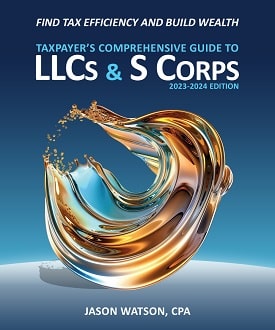Nevada Fallacy of an LLC (or Delaware or Wyoming!)
 By Jason Watson, CPA
By Jason Watson, CPA
Posted Wednesday, October 18, 2023
We just listed out the three most debtor-friendly states, but that’s where it ends. You might have heard that you can avoid taxes by forming an LLC in Wyoming or Nevada- is that true? Sure, if tax fraud comes easy to you. Sorry Charlie, your profits will technically be apportioned (fancy accounting speak for allocated or assigned) to the states in which you operate. Here is a super basic rubric on apportionment which some states use to calculate your tax liability-
- Payroll- One third of your profits are allocated based on payroll. So if you have payroll expenses only in Colorado and California, but are incorporated in Nevada, one third of your LLC’s profits are split between Colorado and California after applying California’s crazy rules. Nothing is allocated to Nevada.
- Property- The second third of your profits are allocated based on property ownership and where it is located, such as real estate, inventory, etc.
- Sales- The last third of your profits are allocated based on sales and sales nexus, but this can get extremely sticky since the definition of where a sale occurs is grey- is it point of sale (seller’s location), point of purchase (buyer’s location), title transfer, fulfillment centers, etc.? Where a sale actually occurs is an argument which states and taxpayers can go around and around with- you can only imagine how it will end fighting a state with virtually unlimited resources and time coupled with their presumption of being right.
So, yes, under nexus rules perhaps a small portion of your profit can be attributed to Nevada- yet, this is not because you were incorporated in Nevada, it’s because you had a presence in a state that does not impose an income tax. Same would be true for all your sales in Wyoming, Washington, Texas, South Dakota, etc. where strict corporate income taxes do not exist. In addition, several states impose a gross sales receipts tax and other forms of taxation (such as franchise tax) although their corporate income tax rate is zero.
Note: This is a super simple sample. Some states give sales a larger weight. Others ignore payroll and property. Talk to your apportionment buddies at WCG. As gray tax positions go, income apportionment is right up there with the best of the “well, it depends” accountant responses.
State Nexus
This apportionment boils down to nexus, and states are getting much more aggressive with claiming nexus so the income generated in that state is taxable. This might make people unhappy, but the reasoning behind it is fair in our opinion. You target a certain group of customers who live in a certain jurisdiction, and you sell computers. Why would Best Buy in the same tax jurisdiction have to pay income taxes in that jurisdiction while you do not? Please don’t use the “it’s just little ol’ me versus the big box store” excuse. Seems a bit unfair if you are Best Buy, or Wal-Mart, or Apple. Go and compete, just make it a level playing field.
Those customers in that jurisdiction perhaps enjoy a smaller tax rate and are able to have more purchasing power. That smaller tax rate might be offset by higher tax rates for the businesses. Business A (Best Buy in this example) has to subsidize the customers in the taxing jurisdiction while Business B (you) does not. Best Buy would be a bit upset in this example.
Avoiding taxes is the American way. We get it. But something about the 14th Amendment and equality and pursuit of happiness comes to mind. Then there’s that darn 16th Amendment.
States define economic presence differently. Some states, such as California, use a sales dollar threshold (sometimes referred to as a bright-line) to determine nexus. WCG is getting close to having enough California business to necessitate filing as a foreign entity there just based on revenue. Yuck, since the income tax rate is twice as much as Colorado’s. California also has a presence test where if you have an agent working for you in California, then you have income tax nexus.
Remember, this is only income sourced to that taxing jurisdiction. About half the states have nexus rules and thresholds. Can’t get enough? Here is a Journal of Accountancy article from 2010 (yeah, it’s a little old but so are most accountants, and it provides a good base to learn from)-
Don’t forget the basics such as bank accounts, licenses and permits. If you must be licensed in another state to legally conduct business such as an agent for an insurance business, this in itself might create nexus.
This book dives deep into the issue of nexus in a later chapter, with topics such as sales tax, FBA (Fulfillment By Amazon), throwback rules, and interstate commerce rules. With the recent South Dakota v. Wayfair U.S. Supreme Court case, the sales tax nexus is going to be transformed over the next several years.
Massive Word of Caution: You might not have recognized it, but we introduced two nexus issues alongside each other. Income tax nexus and sales tax nexus. These are wholly different! Just because you have income tax nexus in a state does not mean you also have sales tax nexus, and vise-versa. This is akin to 401k and IRA. People muddy the waters by interchanging these terms, but they are vastly different. Income tax nexus and sales tax nexus is similar in terms of accidentally mixing the terms.
Foreign Qualification
This has nothing to do with international business. When your business has either a physical or economic presence in another state, you must register as a foreign entity. This is usually a formality, but some states might require your business to be in good standing with the home or “domicile” state. So keep up with your annual filings with the Secretary of State.
Conversely, you might simply want to create another LLC in the satellite state. This allows you to separate financial liability- for example, you might get sued in one state with unfavorable tax laws yet protect your interests in the other state (separate LLC). Bankruptcy laws change by state as well. Something to consider and be reviewed by a competent attorney.
Nevada Fallacy Recap
So, don’t believe the Nevada hype. You can probably get away with not paying state income taxes on your own, but as tax and accounting professionals we are bound by such inconveniences like ethics and law. Sorry.
Another example to chew on- you have a home office in Maryland. You commute to Washington, D.C. to work for your only client. You incorporate in Maryland since that is where your home office is, and you pay yourself a wage subject to Maryland income taxes. Wait there’s more. You also have a presence in D.C. requiring a D.C. corporate tax return as a foreign entity in addition to your Maryland corporate tax return. Thankfully these and other jurisdictions have reciprocity rules, and we can help navigate.
The bottom line is that Nevada tax laws benefit business owners with a presence in Nevada. As Zig Ziglar would say, “You might get a free lunch on consignment, but eventually you’ll have to pay.” We encourage you to not game the system, and if you want to, WCG cannot be a part of it- we have too many clients relying on us to do the right thing. Please pay your fair share of taxes, just not a dollar more.
Having said that, there are a zillion reasons why forming a corporation or an LLC in a tax friendly state does make sense. But those are case-by-case scenarios. Nothing is a slam-dunk or carte blanche either way. The right questions must be asked and answered to reach the best decision.
Wanna Talk About Your Small Business?
Please use the form below to tell us a little about yourself, and what you have going on with your small business or 1099 contractor gig. WCG CPAs & Advisors are small business CPAs, tax professionals and consultants, and we look forward to talking to you!




